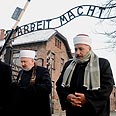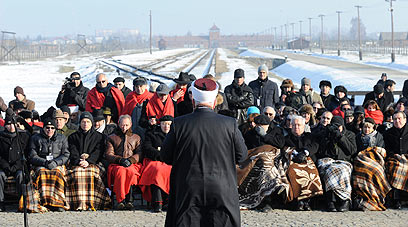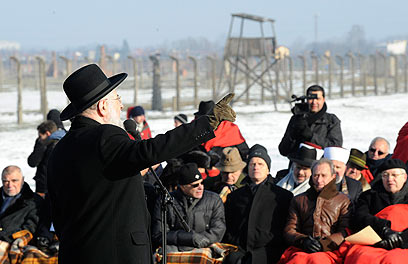
Muslim leaders visit Auschwitz
Imams, clerics from dozens of countries speak out against Holocaust denial, racism in Mideast
AUSCHWITZ – Muslims, Jews, and Christians marched towards Auschwitz death camp this week, among the ice-capped trails in the freezing Polish winter.
Wool caps, turbans, and rabbis' top hats could be seen huddled together in the cold for a moment of silence near the ruins of the crematoriums.
"I feel true pain," said British Imam Abdul-Jalil Saeed as he walked through the shacks of Birkenau.
"I believe the Muslims must stand by their Jewish friends, because anti-Semitism in Europe is on the rise and where there is anti-Semitism Islamophobia is not far behind. It is a matter of educating our future generations," he said.
"Much has been said so far but if we want true change we must act." When he returns to Britain, Saeed said, he plans to organize a seminar and write pamphlets about his experience at the death camp – anything to get the message across.
When asked whether he believed worshippers at his mosque were prepared to hear such messages he answered, "People understand. I can't say everyone – there will always be bad and incendiary people – but we must ignore them or, if they do something illegal, lock them up.
"We must focus on the silent majority so that it will march forward and say: Never again."
Diary of Anne Frank in Persian
Anne-Marie Revcolevschi, president of the Aladdin Project, which organized the trip together with UNESCO and the Paris municipality, says that in order to understand the lessons of the Holocaust we must understand the language of the other.
Aladdin has been working for two years to raise awareness and fight racism, and has been responsible for translations of various materials about the Holocaust into many languages, including The Diary of Anne Frank, which is now available in Persian.
"There are many trips to Auschwitz, but what makes this trip special is that it has brought here for the first time 200 people from five continents and 40 countries, among them many Muslims – intellectuals, clerics, politicians, imams, and mayors. It is important that you pass this on," she said.
"We don't bring people here to make them cry. This is not the aim of Project Aladdin," Revcolevschi added. "This is an educational project for the long term."
The delegation, comprised of 150 people, included citizens of Morocco, Jordan, Turkey, and Iraq, as well as rabbis and priests, who flew from Paris to Krakow and from there traveled to Birkenau by bus. Some canceled their participation due to the uprisings in Tunisia and Egypt, but Muslim presence was still tangible.

Delegates huddle together for warmth (Photo: AP)
Nakba, Kurd massacre remembered
On the bus to Birkenau, tension and excitement could be sensed. "We'll arrive in an hour," the Polish guide says. "You have to promise us we'll come back," responds Rabbi Yisrael Meir Lau, who survived Buchenwald death camp. "I know some people who went there and never returned."
Muslim leaders, meanwhile, discussed the importance of Holocaust remembrance for the improvement of relations in the Middle East.
"As a Kurd it reminds me of what happened in Kurdistan in the 20th century," said Ahmed Anwar Dezaye, president of Salahaddin University in Iraq.
"What happened to us is just a small example of what happened here. It reminds me of human cruelty and how important the lesson is, and I want everyone to come here and see how important it is to live in peace," he explained.
"We teach about the Holocaust in our university, but it is different to actually see it, you feel like you’re inside the real thing. It teaches us a valuable lesson on living with peace and dialogue."
Dr. Mohammed Rajani, one of the Palestinian members of the delegation, described the death camp as the "heart of darkness".
"It makes me understand the importance of faith, man's ability to rise from the ashes and build a better world. This is hell on earth. We must do better things, look out for one another – Muslims, Jews, atheists – so we can have heaven and not hell," he said.
Rajani also remarked on comparisons often made between the Holocaust and the Nakba, or expulsion of Palestinians from their land in 1948.
"We do not compare the Nakba and the Holocaust as if the atrocities that occurred are on the same level, but rather in the sense of a man living at home in peace and security when suddenly evil comes and he is thrown far from this security," he said.
"I feel we must have empathy for each other, in the sense that I as a Palestinian must understand what the Holocaust means to a Jew and a Jew must understand what the Nakba is to a Palestinian. From there we can find a meeting point. You have suffered and I have suffered, so you as a victim must help me so that neither of us suffers."

Survivor Rabbi Lau: You are all now witnesses (Photo: AP)
'Ahmadinejad just wants to be liked'
Kareem Lahidji, the president of the Iranian League for the Defense of Human Rights, criticized the Iranian president for denying the Holocaust. "Ahmadinejad with his Holocaust denial wants only to be liked in the Arab street, and is trying to take sides in the conflict between Israelis and Palestinians," he said.
André Azoulay, a senior adviser to King Mohammed VI of Morocco who is also active in the Aladdin Project, stressed the political significance of the trip.
"For the first time dozens of Arabs and Muslims are here with us, proving that the Arab world is not just comprised of anti-Semites and Holocaust deniers. We are here today to remember history, to remember that Nazi barbarism was European and Christian but in those times there was light from Arab countries," he said.
"I am proud of my country, Morocco, for refusing to impose Vichy law and Nazi law on its Jews, as well as of the fact that in many countries in North Africa, from Morocco to Turkey, the righteous of the nations said no to the Nazis. The world must also recognize this aspect."
Another member of the delegation, who preferred to be presented as an anonymous Iraqi, said the lessons of the Holocaust must be used to prevent future massacres.
"Almost every one of our cities had a Jewish quarter," he recounted. "As children, we knew what happened to the Jews during World War II. We heard about it from childhood and there was great sympathy among the Kurdish sector for the suffering and injustice suffered by the Jews.
"We also suffered genocide in our region at the hands of our neighbors so we are sensitive to any injustice and genocide, no matter where in the world. There is solidarity among victims. I hope that there will be fewer victims in this century than the last. There is hope for democracy and reform that we need very much in our region, which knows so much violence."
Before exiting through Auschwitz's haunting gate, we gathered to light candles in memory of the victims. Rabbi Lau thanked the Muslim delegates, and reminded everyone present that the lessons of the Holocaust have not yet been learned if massacres like that which occurred in Kosovo were still being carried out.
"You are all now witnesses," he said.
Grand Mufti of Bosnia Mustafa Ceric agreed. "I wanted to see it with my own eyes. What you hear and what you see are not the same thing," he said.
"I never cared about Auschwitz and never knew about it until it happened to my people, and I am here to tell you and the whole world not to wait for the next genocide. You have the ability to prevent it. If we had prevented the Holocaust in Auschwitz, we could have prevented the Srebrenica massacre."
- Follow Ynetnews on Facebook










